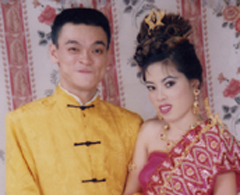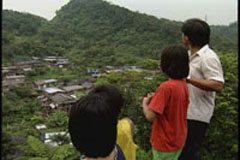Coming and Going, Island of Tachen

More than a hundred years ago, ancestors of the Tachen people came from coastal region of Zhejiang County to Tachen Island, after the yellow croakers.
More than forty years ago, because of the confrontation between the KMT and the communist, they came to Taiwan and become anti-communist heroes.
Thirty years ago, for the need to have better living, they stowed away to America and became chefs. And now in this new century, where is the next dream land for the adventurous Tachen people?
After the cross strait opening, the Tachens traveling back home found everything changed on the island, even their ancestors’ graves had been hollowed out. The root-finding dream has foamed into bubbles. For their second generation living in the US, identity becomes an issue. In the US, they’ve been considered to be Chinese; in China, Taiwanese; in Taiwan, those of other provinces. Tachens’ pain of not being recognized can only be swallowed in. To give their descendants a better living, they have to continue their painful odyssey.




